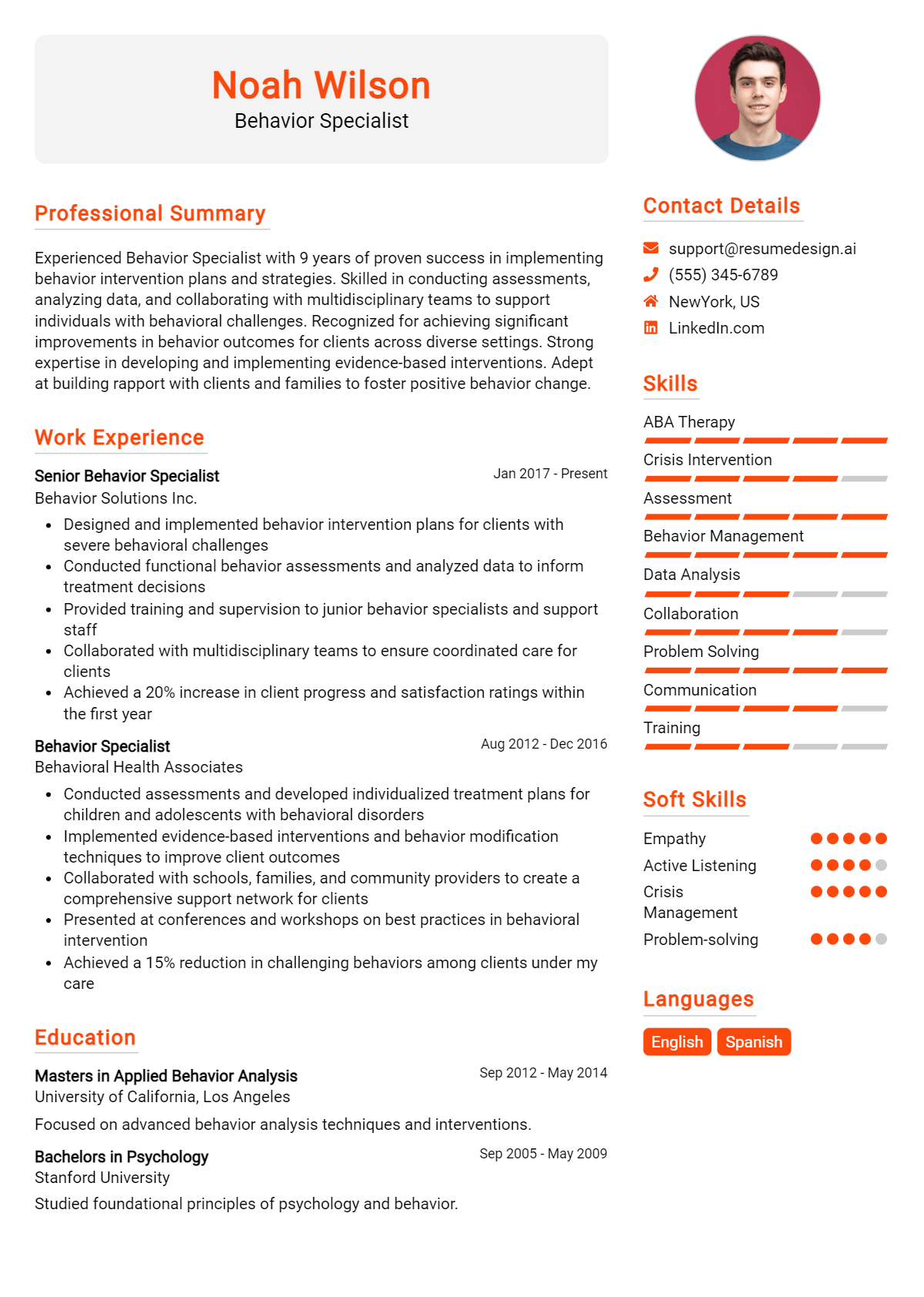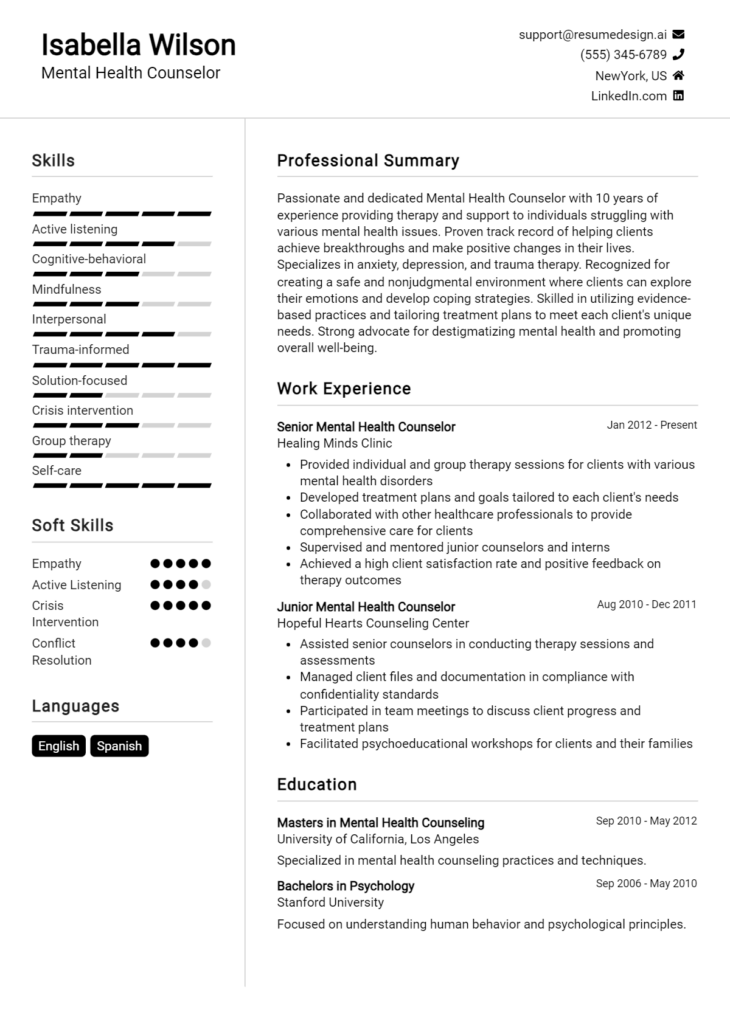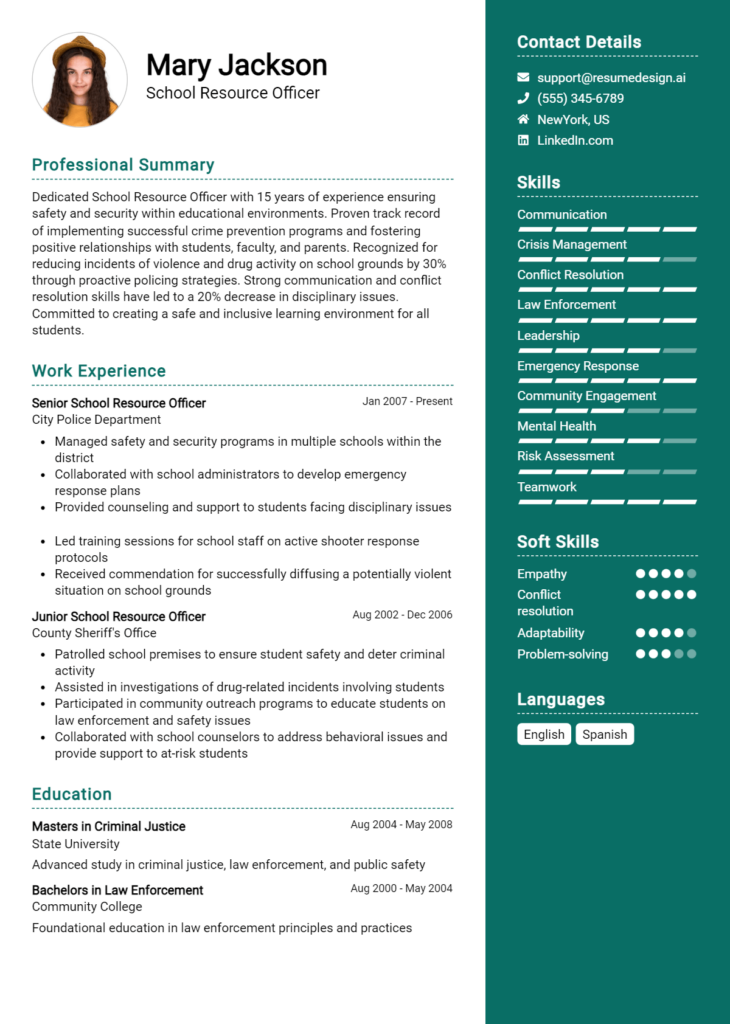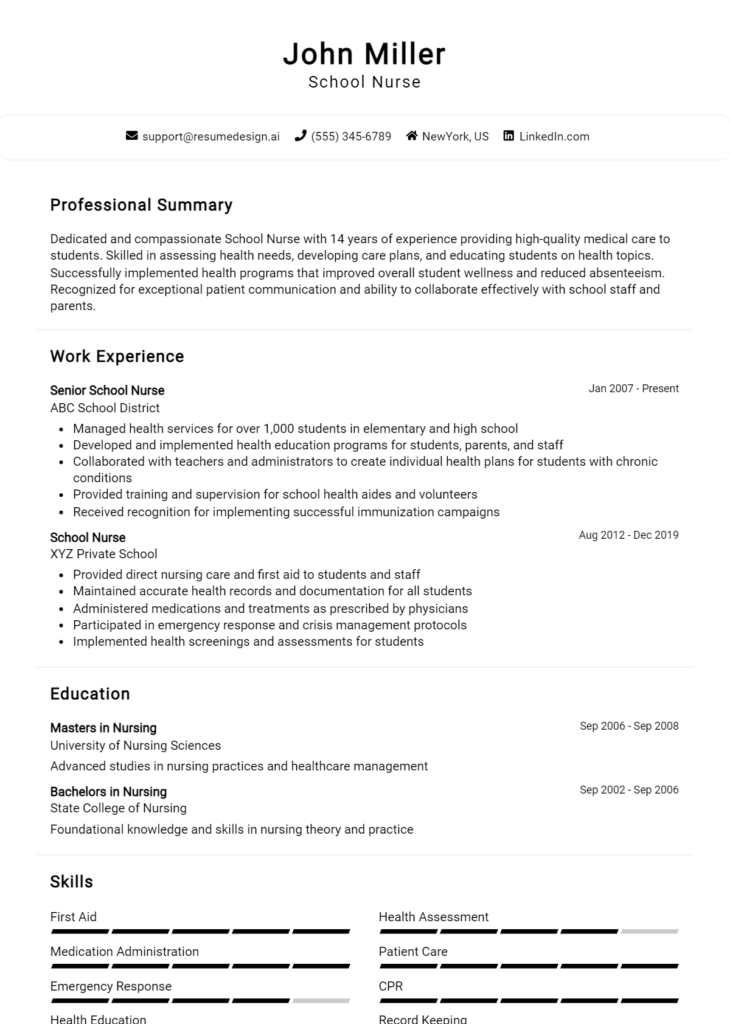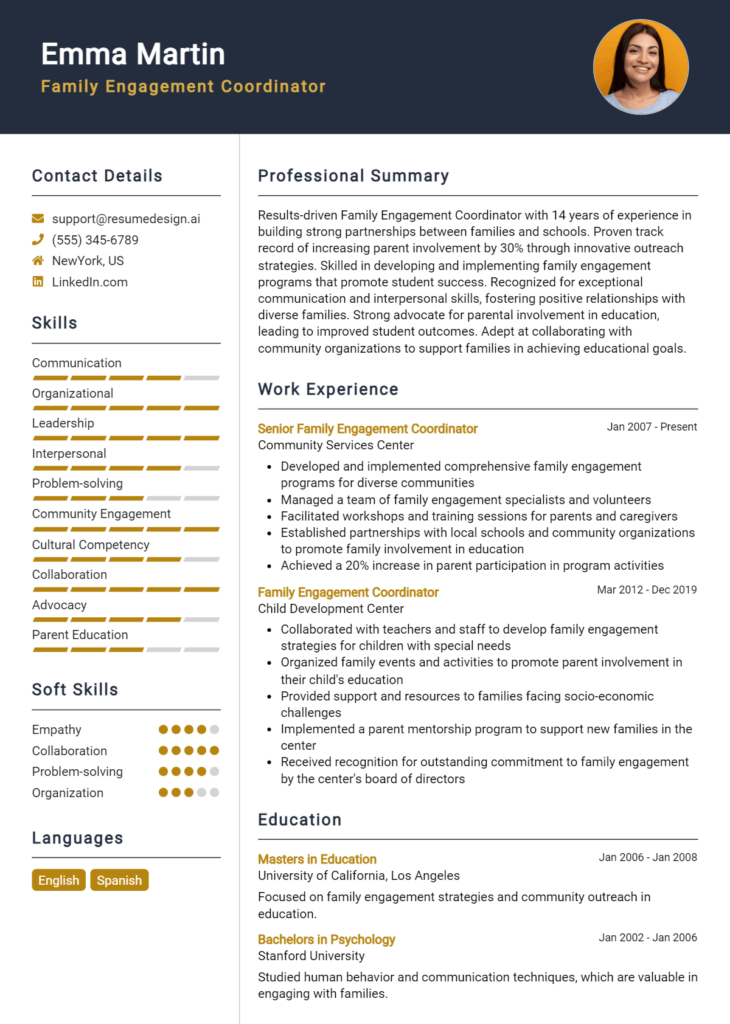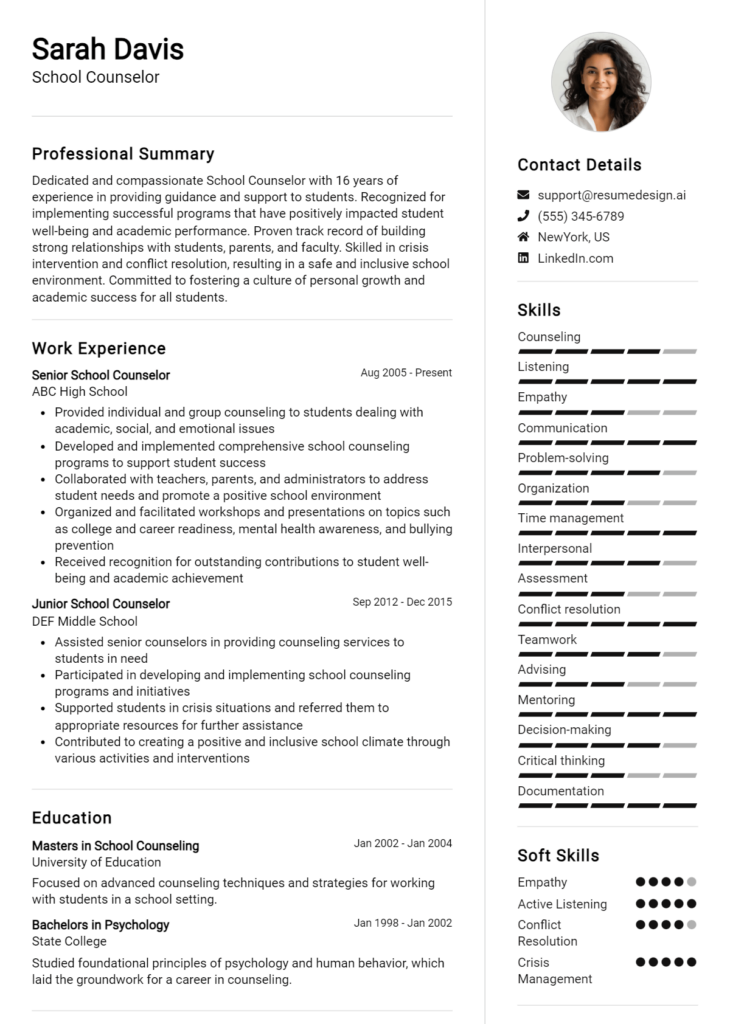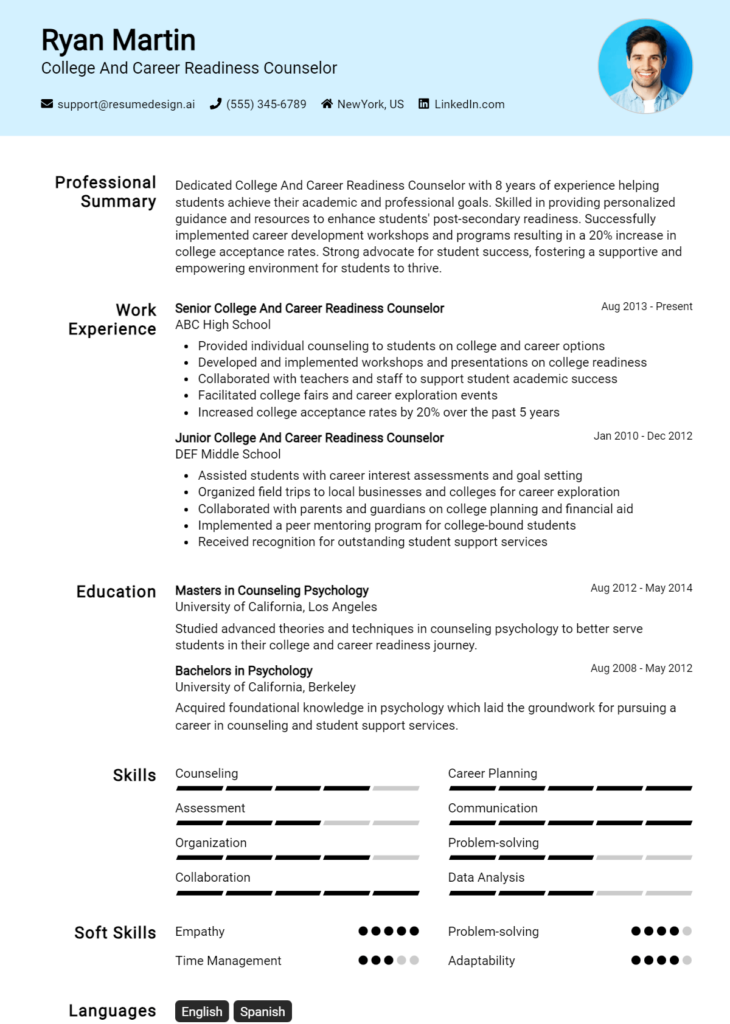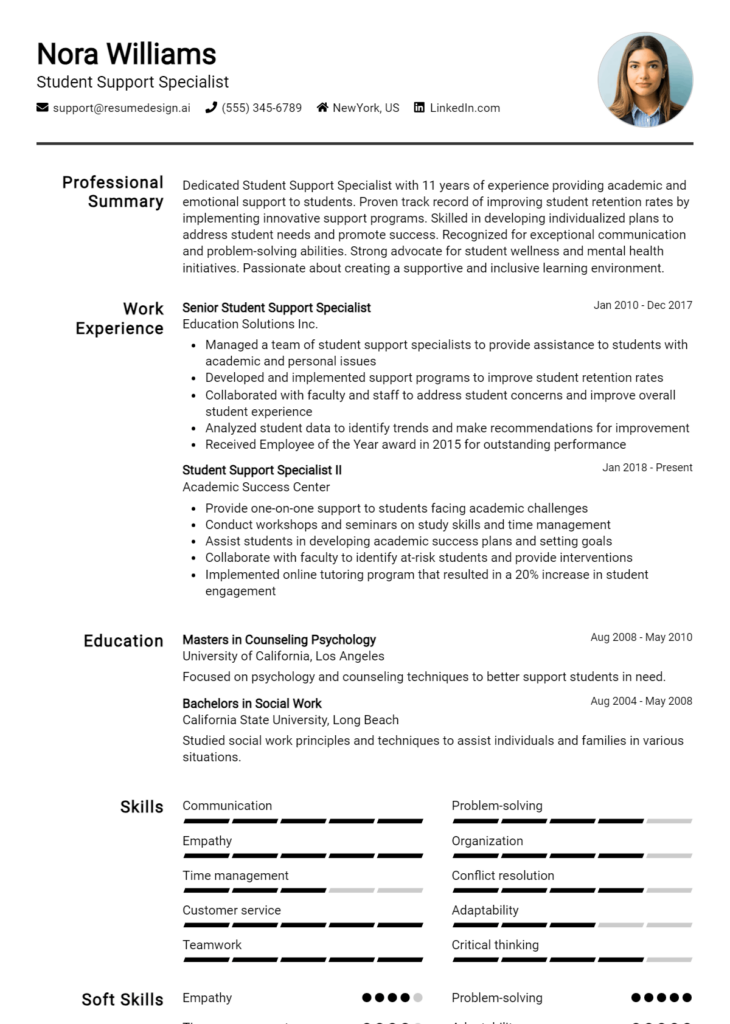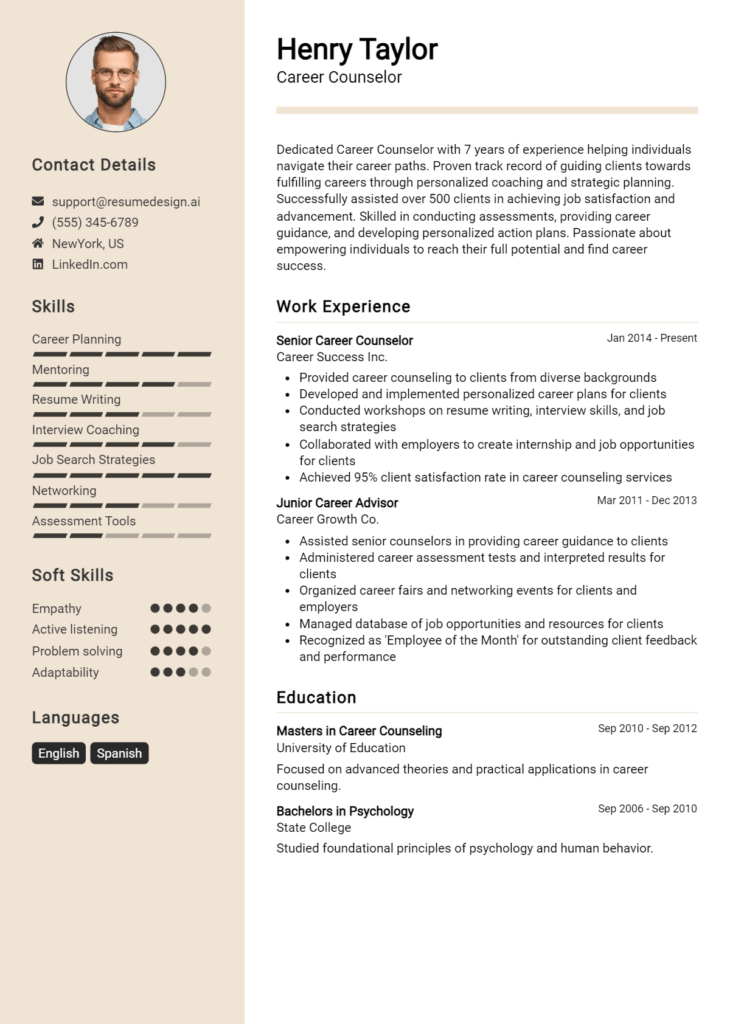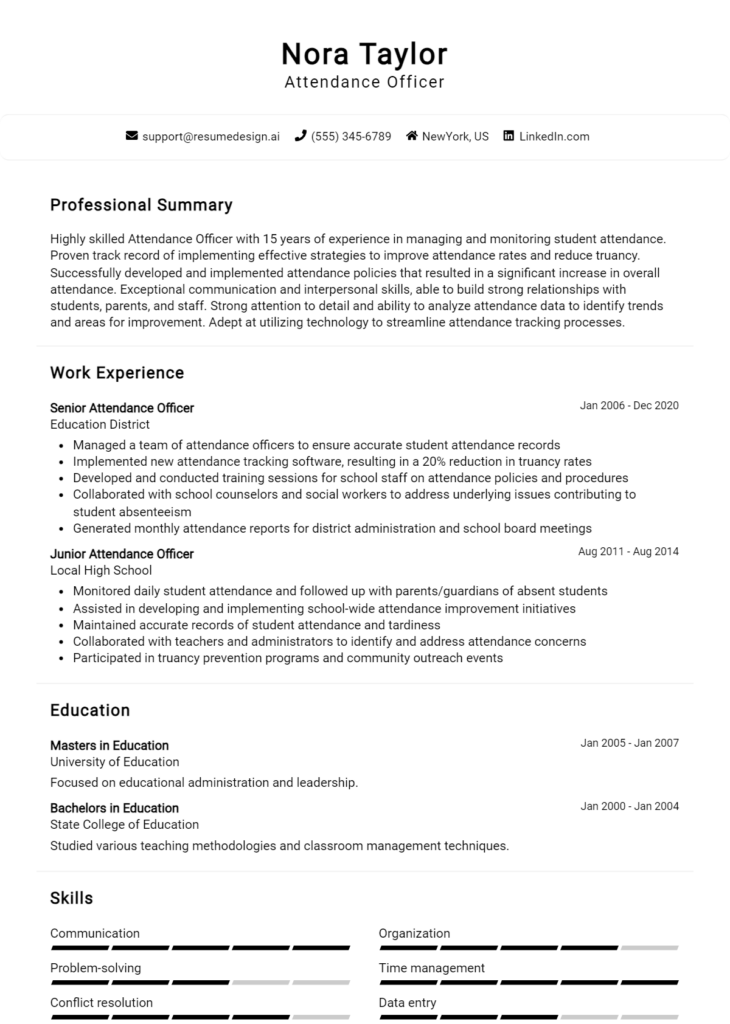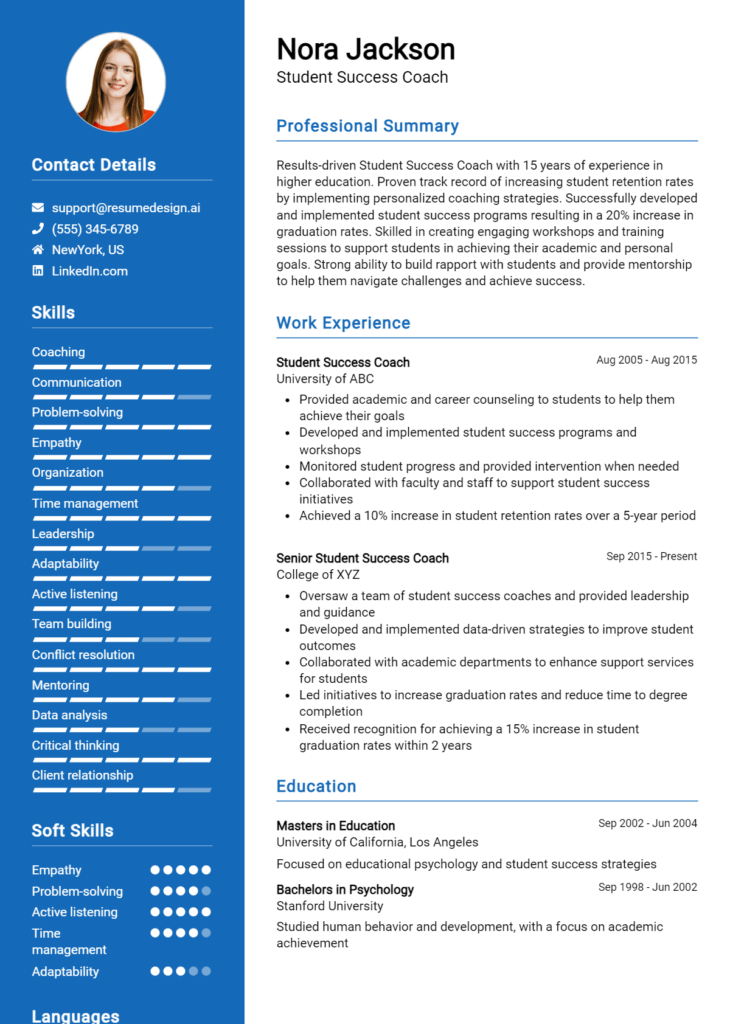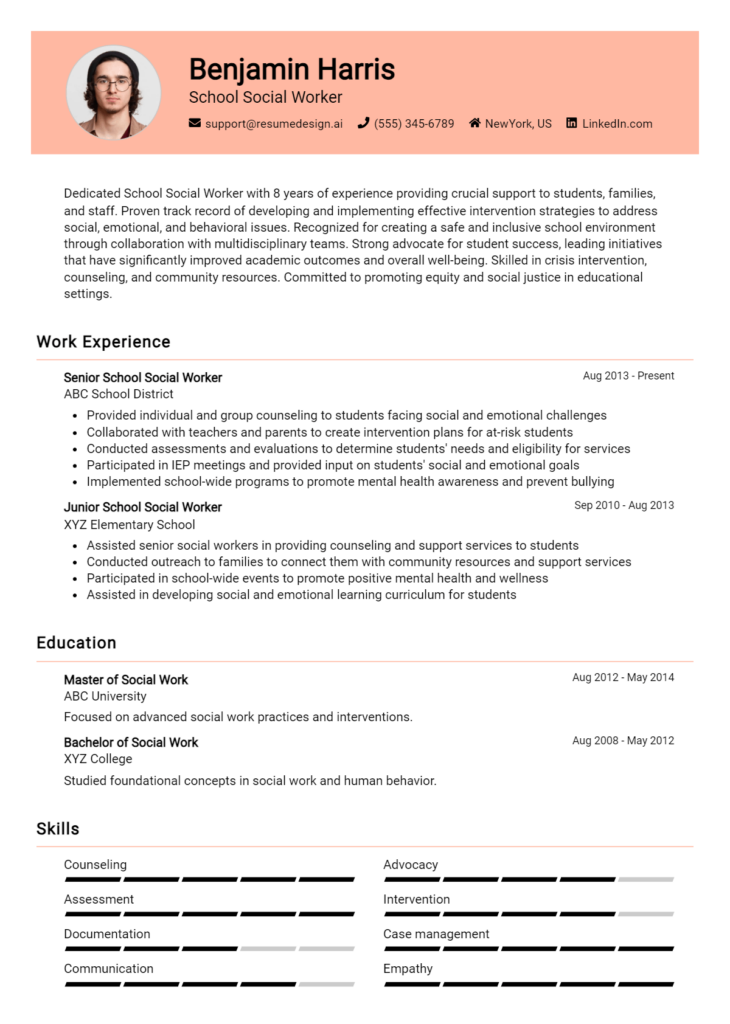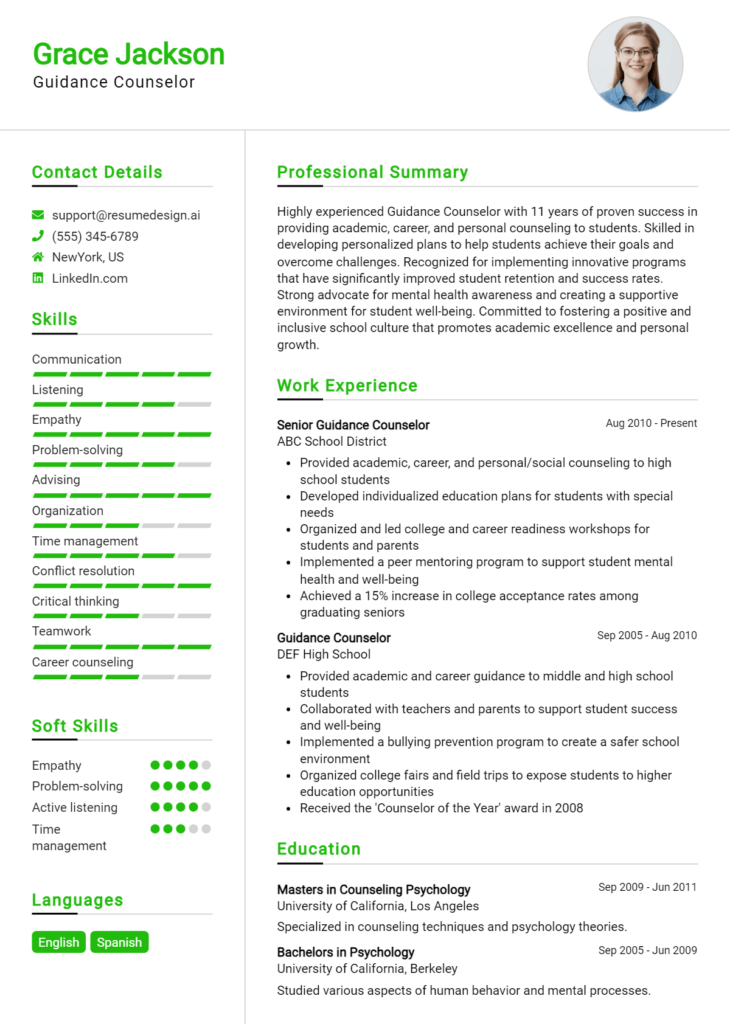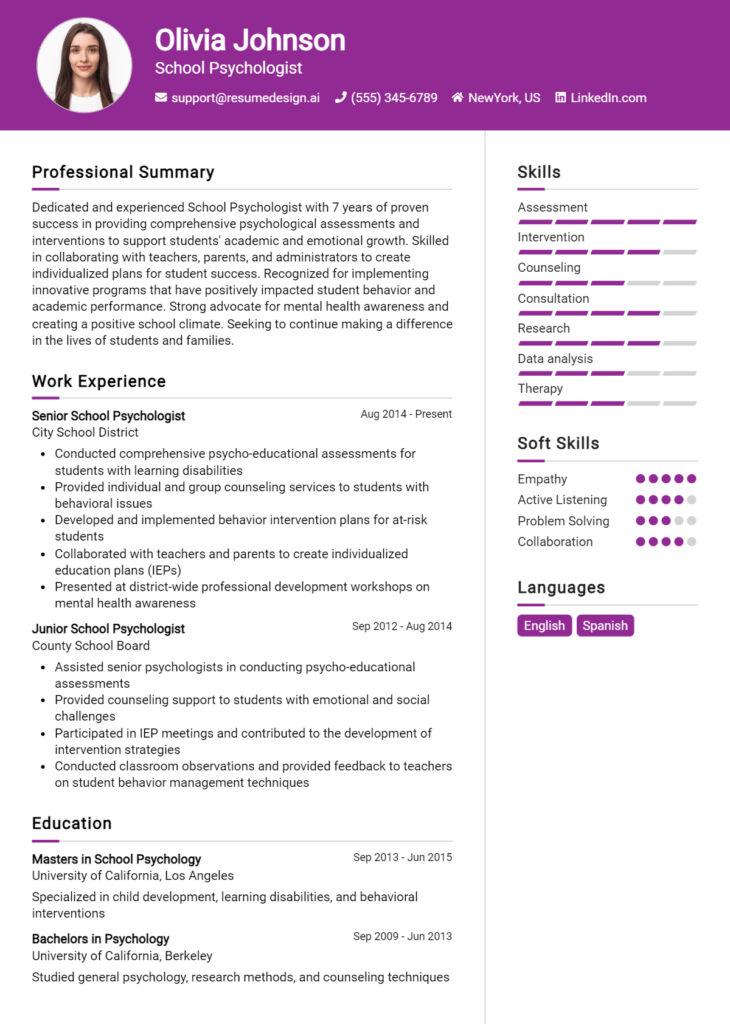Behavior Specialist Core Responsibilities
A Behavior Specialist plays a crucial role in enhancing organizational effectiveness by applying technical, operational, and problem-solving skills to analyze and modify challenging behaviors. They collaborate across departments, bridging gaps between educators, mental health professionals, and families to implement effective behavioral interventions. Successful Behavior Specialists possess strong communication abilities and critical thinking skills, which are essential for developing strategies that align with the organization's goals. A well-structured resume can effectively showcase these qualifications, demonstrating the candidate's expertise and commitment to fostering positive behavioral outcomes.
Common Responsibilities Listed on Behavior Specialist Resume
- Conduct comprehensive behavioral assessments to identify needs and challenges.
- Develop and implement individualized behavior intervention plans.
- Collaborate with educators and support staff to promote positive behavior in the classroom.
- Train staff on behavioral strategies and techniques.
- Monitor and evaluate the effectiveness of behavior interventions.
- Maintain accurate and up-to-date documentation of behavioral data.
- Provide crisis intervention and support during challenging situations.
- Facilitate workshops and training sessions on behavior management.
- Engage with families to support behavior change at home.
- Analyze data to inform program improvements and adjustments.
- Stay current with best practices and trends in behavioral science.
High-Level Resume Tips for Behavior Specialist Professionals
In today's competitive job market, a well-crafted resume is crucial for Behavior Specialist professionals looking to make a strong first impression on potential employers. Your resume serves as the initial representation of your skills and achievements, showcasing your expertise in behavior analysis, intervention strategies, and client support. It’s essential to create a compelling document that not only highlights your qualifications but also aligns with the specific needs of the job you are applying for. This guide will provide practical and actionable resume tips tailored for Behavior Specialist professionals, helping you to stand out in a crowded field.
Top Resume Tips for Behavior Specialist Professionals
- Tailor your resume to each job description by using keywords and phrases that match the employer's requirements.
- Highlight relevant experience in behavior analysis, therapy implementation, and client assessments to demonstrate your expertise.
- Quantify your achievements by including metrics, such as the percentage of improvement in client behavior or the number of clients successfully supported.
- Showcase industry-specific skills such as data collection, behavioral intervention techniques, and crisis management.
- Include certifications and training relevant to the Behavior Specialist role, such as BCBA or RBT credentials.
- Utilize a clean, professional format that is easy to read, utilizing bullet points for clarity and conciseness.
- Incorporate a summary or objective statement that outlines your career goals and key strengths as a Behavior Specialist.
- Use action verbs to describe your responsibilities and accomplishments, making your contributions stand out.
- Keep your resume to one or two pages, focusing on the most relevant and impactful information.
- Proofread your resume carefully to eliminate any typos or grammatical errors, ensuring a polished presentation.
By implementing these tips, you can significantly enhance your resume and increase your chances of landing a job in the Behavior Specialist field. A polished and tailored resume not only showcases your qualifications but also reflects your commitment to the profession, helping you to capture the attention of hiring managers and secure that coveted interview.
Why Resume Headlines & Titles are Important for Behavior Specialist
In the competitive field of behavior analysis and therapy, a well-crafted resume headline or title serves as a critical first impression for hiring managers. For a Behavior Specialist, this headline should not only capture attention but also succinctly encapsulate the candidate's key qualifications and expertise in working with individuals exhibiting behavioral challenges. A strong headline can effectively summarize the applicant's strengths and set the tone for the rest of the resume, making it easier for employers to quickly assess a candidate's suitability for the role. It must be concise, relevant, and directly aligned with the job description to stand out in a crowded applicant pool.
Best Practices for Crafting Resume Headlines for Behavior Specialist
- Keep it concise—aim for one impactful phrase.
- Use specific language that reflects the role and responsibilities of a Behavior Specialist.
- Highlight key qualifications or relevant experience directly related to the job.
- Incorporate industry-specific keywords to enhance visibility.
- Avoid vague terms; be as descriptive as possible.
- Tailor the headline for each application, reflecting the specific job posting.
- Showcase any certifications or specialized training that add value.
- Make it compelling by using action verbs or results-oriented phrases.
Example Resume Headlines for Behavior Specialist
Strong Resume Headlines
Dedicated Behavior Specialist with 5+ Years of Experience in Applied Behavior Analysis
Certified Behavior Analyst Specializing in Autism Spectrum Disorder Interventions
Compassionate Behavior Specialist Committed to Enhancing Client Independence and Quality of Life
Experienced Behavior Specialist with Proven Success in Implementing Effective Behavioral Strategies
Weak Resume Headlines
Behavior Specialist Seeking Job
Professional in Behavioral Therapy
The strong headlines are effective because they are specific, convey relevant experience, and highlight the candidate's strengths in a way that aligns with the job description. They immediately communicate the candidate's qualifications and focus, prompting hiring managers to want to learn more. In contrast, the weak headlines fail to impress due to their generic nature and lack of detail, making it difficult for employers to gauge the candidate's suitability for the role. A strong, targeted headline can differentiate a candidate in a sea of applicants and set the stage for a compelling resume.
Writing an Exceptional Behavior Specialist Resume Summary
A well-crafted resume summary is crucial for a Behavior Specialist as it serves as the first impression for hiring managers. A strong summary swiftly captures attention by effectively showcasing essential skills, relevant experience, and notable accomplishments pertinent to the role. It distills the candidate's qualifications into a concise, impactful statement that reflects their suitability for the position, making it easier for employers to quickly identify potential fits for their team. Tailoring this summary to the specific job being applied for enhances its effectiveness, ensuring it aligns with the unique requirements of the role.
Best Practices for Writing a Behavior Specialist Resume Summary
- Quantify Achievements: Use numbers to highlight your impact, such as the number of clients served or percentage of behavioral improvement.
- Focus on Skills: Identify and emphasize key skills that are directly relevant to the Behavior Specialist role, such as assessment techniques and intervention strategies.
- Tailor the Summary: Customize your summary for each job application to reflect the specific qualifications and experiences mentioned in the job description.
- Be Concise: Aim for 3-5 sentences that provide a clear overview without overwhelming the reader.
- Use Action Verbs: Start sentences with strong action verbs to convey confidence and proactivity.
- Highlight Relevant Experience: Briefly mention specific experiences that demonstrate your expertise in behavior analysis and intervention.
- Showcase Soft Skills: Include interpersonal skills such as communication and empathy that are vital for working with clients and families.
- Stay Professional: Maintain a formal tone that reflects your professionalism and dedication to the field.
Example Behavior Specialist Resume Summaries
Strong Resume Summaries
Dedicated Behavior Specialist with over 5 years of experience developing and implementing individualized behavior intervention plans for children with autism. Increased positive behavior outcomes by 30% through data-driven strategies and collaborative family involvement.
Compassionate Behavior Specialist skilled in conducting behavioral assessments and crafting tailored support strategies. Successfully reduced incident reports by 40% in a residential treatment program, fostering a safer environment for clients.
Results-oriented Behavior Specialist with a proven track record of improving behavioral health outcomes. Achieved a 25% increase in client engagement through innovative therapeutic techniques and family training workshops.
Weak Resume Summaries
Experienced Behavior Specialist looking for a new opportunity to use my skills and help clients.
Behavior Specialist with some experience in the field. I am passionate about helping people and want to make a difference.
The examples categorized as strong are effective because they provide specific details, quantify achievements, and highlight relevant skills, making a clear case for the candidate's qualifications. In contrast, the weak summaries lack specificity and measurable outcomes, making them appear generic and less compelling, failing to effectively communicate the candidate's value to potential employers.
Work Experience Section for Behavior Specialist Resume
The work experience section of a Behavior Specialist resume is crucial for demonstrating the candidate's expertise in behavioral analysis and intervention strategies. This section not only highlights the technical skills acquired over years of practice but also illustrates the candidate's ability to manage teams effectively and deliver high-quality services to clients. By quantifying achievements—such as the number of clients served or improvements in behavioral outcomes—and aligning their experience with industry standards, candidates can significantly enhance their appeal to potential employers.
Best Practices for Behavior Specialist Work Experience
- Clearly define your role and responsibilities in each position to showcase your technical expertise.
- Quantify your achievements, such as improvements in client behavior metrics or successful program implementations.
- Highlight collaborative efforts with other professionals, including teachers, therapists, and family members.
- Use action verbs to convey a sense of initiative and leadership in your work.
- Tailor your experiences to align with industry standards and the specific requirements of the job you are applying for.
- Include relevant certifications or training that enhance your credibility as a Behavior Specialist.
- Focus on results-driven outcomes that reflect your impact on clients' lives.
- Keep the descriptions concise and focused, avoiding jargon that may not be understood by all readers.
Example Work Experiences for Behavior Specialist
Strong Experiences
- Developed and implemented a behavior modification program that resulted in a 30% reduction in disruptive behaviors among clients over six months.
- Led a multidisciplinary team of 10 professionals in creating individualized treatment plans, improving client satisfaction scores by 40% within a year.
- Provided training and mentorship to junior staff, enhancing team efficiency and increasing the successful completion of treatment goals by 25%.
- Collaborated with local schools to integrate behavioral interventions, which improved academic performance for 80% of participating students.
Weak Experiences
- Worked with clients on behavior issues.
- Assisted with team meetings and discussions.
- Helped develop programs for clients.
- Participated in training sessions.
The strong experiences listed above are effective because they provide quantifiable outcomes and demonstrate leadership and collaboration, showcasing the candidate's impact in their roles. In contrast, the weak experiences lack specificity and measurable results, making them less compelling to potential employers. Effective resumes highlight relevant achievements and skills, which are essential for standing out in the competitive field of behavior analysis.
Education and Certifications Section for Behavior Specialist Resume
The education and certifications section of a Behavior Specialist resume is crucial as it serves to highlight the candidate's academic background, relevant industry certifications, and commitment to continuous learning in the field. This section not only demonstrates the foundational knowledge necessary for effective behavior support but also showcases specialized training and coursework that align with the demands of the role. By presenting relevant qualifications and certifications, candidates can significantly enhance their credibility and demonstrate their readiness to contribute to the well-being of individuals requiring behavioral assistance.
Best Practices for Behavior Specialist Education and Certifications
- Prioritize relevant degrees in psychology, social work, or education that relate to behavior analysis.
- Include certifications such as Board Certified Behavior Analyst (BCBA) or Registered Behavior Technician (RBT).
- List any specialized training in behavior intervention strategies or crisis intervention.
- Provide details on pertinent coursework that showcases your expertise in behavioral assessment and intervention techniques.
- Highlight any ongoing professional development or workshops attended to show a commitment to staying current in the field.
- Be specific about the level of certification and the issuing organization to add credibility.
- Consider including honors or recognitions received during your educational journey.
- Avoid listing irrelevant degrees or certifications that do not pertain to the behavior specialist role.
Example Education and Certifications for Behavior Specialist
Strong Examples
- M.A. in Applied Behavior Analysis, University of XYZ, 2022
- Board Certified Behavior Analyst (BCBA), Certification #12345, 2023
- Registered Behavior Technician (RBT), Certification #67890, 2021
- Coursework in Behavioral Assessment and Intervention Strategies, University of XYZ
Weak Examples
- Bachelor’s Degree in History, University of ABC, 2010
- Certification in Basic First Aid, 2019
- Online Course in General Psychology, 2020
- High School Diploma, 2005
The strong examples are considered effective because they directly align with the qualifications and skills necessary for a Behavior Specialist role, showcasing relevant degrees and industry-recognized certifications. In contrast, the weak examples highlight educational achievements and certifications that do not pertain to behavioral health or the specific demands of the position, which can detract from the candidate's suitability for the role.
Top Skills & Keywords for Behavior Specialist Resume
In the field of behavioral health, having a well-crafted resume that highlights relevant skills is crucial for a Behavior Specialist. These skills not only demonstrate your expertise but also reflect your ability to effectively understand and address the needs of individuals with behavioral challenges. A strong resume will showcase a blend of both hard and soft skills, allowing potential employers to see the full spectrum of your capabilities. Tailoring your resume to include these key skills can make a significant difference in securing interviews and advancing your career in this rewarding profession.
Top Hard & Soft Skills for Behavior Specialist
Soft Skills
- Empathy
- Communication
- Problem-solving
- Patience
- Active listening
- Adaptability
- Team collaboration
- Conflict resolution
- Critical thinking
- Cultural competence
- Motivation and encouragement
- Time management
- Stress management
- Ethical judgment
Hard Skills
- Behavioral assessment techniques
- Data collection and analysis
- Knowledge of ABA (Applied Behavior Analysis)
- Crisis intervention strategies
- Development of behavior intervention plans
- Understanding of mental health disorders
- Training in specific therapeutic modalities
- Familiarity with psychological testing
- Report writing and documentation
- Knowledge of relevant laws and regulations
- Experience with client case management
- Proficiency in using behavioral management software
- Training and supervision of staff or caregivers
- Development of individualized education plans (IEPs)
- Statistical analysis for outcome measurement
- Knowledge of sensory integration techniques
- Familiarity with family dynamics and support systems
For more detailed guidance on how to incorporate these skills into your resume, as well as strategies for highlighting your work experience, please refer to the linked resources.
Stand Out with a Winning Behavior Specialist Cover Letter
Dear [Hiring Manager's Name],
I am writing to express my interest in the Behavior Specialist position at [Company/Organization Name], as advertised on [where you found the job listing]. With a solid background in psychology and extensive experience working with diverse populations to promote positive behavior change, I am excited about the opportunity to contribute my skills and passion for supporting individuals in achieving their personal best.
In my previous role at [Previous Company/Organization Name], I successfully developed and implemented behavior intervention plans tailored to the unique needs of clients, including those with autism spectrum disorders and emotional disturbances. My collaborative approach allowed me to work closely with educators, parents, and other professionals to foster a supportive environment that encourages growth and learning. By utilizing evidence-based strategies and ongoing assessment, I was able to improve client outcomes significantly, helping them to develop essential social skills and emotional regulation.
I am particularly impressed by [Company/Organization Name]'s commitment to [specific value, mission, or project of the company], and I believe that my innovative mindset and dedication to professional development align well with your team. I am eager to bring my expertise in behavior analysis and my passion for advocacy to your organization, ensuring that every client receives the tailored support they need to thrive. I am confident that my proactive approach and strong communication skills would make me an asset to your team.
Thank you for considering my application. I look forward to the opportunity to discuss how my background and skills can contribute to the exceptional work being done at [Company/Organization Name]. I am excited about the possibility of collaborating to create meaningful change and support for individuals and their families.
Sincerely,
[Your Name]
[Your Contact Information]
Common Mistakes to Avoid in a Behavior Specialist Resume
When crafting a resume as a Behavior Specialist, it's essential to present your qualifications and experience effectively. Many candidates make common mistakes that can hinder their chances of landing an interview. Being aware of these pitfalls can help you create a standout resume that showcases your skills and expertise in behavior analysis and intervention. Here are some common mistakes to avoid:
Generic Objective Statements: Using a vague objective that doesn't specify your goals or how you can contribute to the organization can make your resume blend in rather than stand out.
Overloading with Jargon: While it's important to demonstrate your knowledge, overusing technical terms can confuse the reader. Aim for clarity and accessibility in your language.
Neglecting Measurable Achievements: Failing to quantify your accomplishments can weaken your resume. Include specific, measurable outcomes from your previous roles to illustrate your impact.
Inconsistent Formatting: A resume that lacks a cohesive format can be distracting. Ensure consistent font sizes, styles, and spacing to enhance readability.
Ignoring Relevant Certifications: Not highlighting relevant certifications or training can diminish your qualifications. Make sure to prominently feature any credentials that are pertinent to the role.
Including Irrelevant Experience: Listing unrelated work experience can dilute the focus of your resume. Tailor your job history to emphasize roles that directly relate to behavior analysis.
Spelling and Grammar Errors: Small mistakes can leave a negative impression. Proofread your resume multiple times to eliminate typos and grammatical errors.
Not Tailoring the Resume for Each Application: Sending out a one-size-fits-all resume can be detrimental. Customize your resume to align with the specific requirements and values of each position you apply for.
Conclusion
As a Behavior Specialist, your role is pivotal in supporting individuals to develop essential skills and adapt positive behaviors. Throughout this article, we explored the various responsibilities that come with the position, including conducting assessments, developing intervention strategies, and collaborating with families and educators. We also highlighted the importance of continuous professional development to stay updated on the latest methodologies and best practices in behavior management.
In conclusion, it is crucial to ensure your resume effectively reflects your unique skills and experiences as a Behavior Specialist. A well-crafted resume can make a significant difference in your job search, showcasing your qualifications and dedication to potential employers.
Now is the time to review and enhance your Behavior Specialist resume! Utilize tools such as resume templates to create a visually appealing layout, or try the resume builder for a step-by-step guide in crafting your document. For inspiration, check out our extensive collection of resume examples tailored for Behavior Specialists. Additionally, don’t forget to pair your resume with a compelling cover letter using our cover letter templates. Take action today and set yourself up for success in your career journey!

